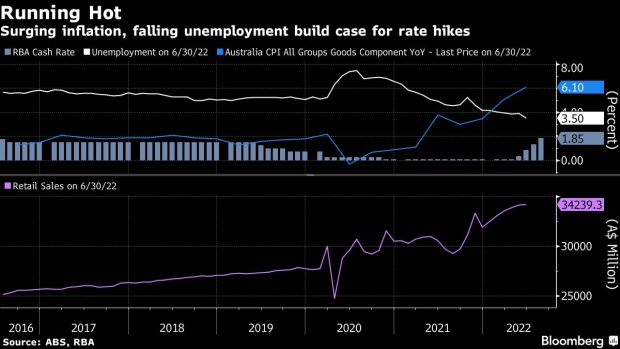Aug 15, 2022
RBA Signals Further Rate Hikes, Reiterates Not on Pre-Set Path
, Bloomberg News

(Bloomberg) -- Australia’s central bank signaled further interest-rate increases would come in the period ahead, while restating it will be guided by incoming economic data and the inflation outlook.
“The board expects to take further steps in the process of normalizing monetary conditions over the months ahead, but it is not on a pre-set path,” minutes of the Reserve Bank’s Aug. 2 policy meeting released on Tuesday showed.
“It is seeking to do this in a way that keeps the economy on an even keel. The path to achieve this balance is a narrow one and subject to considerable uncertainty,” the bank said.
The RBA has given itself some wriggle room to adjust the pace of tightening after three consecutive 50 basis-point hikes took the cash rate to 1.85%. Even so, most economists still expect the bank will raise interest rates by another half-percentage point next month before easing back to more traditional quarter-point moves.
The RBA has joined global counterparts from Washington to Wellington in rapidly tightening policy to try to prevent consumer prices from spiraling out of control. Headline inflation in Australia is running at more than twice the top end of the central bank’s 2-3% target.
Consumer confidence has weakened as households grapple with higher mortgage repayments and rising cost of living pressures. The RBA has signaled it’s trying to get the cash rate up to around 2.5%, or a neutral level, while money markets are pricing in 3.25% by the end of the year.
“The behavior of household spending continued to present a key source of uncertainty for the outlook,” the RBA said. “Higher inflation and higher interest rates were putting pressure on household budgets.”
There are early signs of easing retail demand as house prices decline, with internal data from major banks pointing to a cooling in spending trends.
The RBA nonetheless expects domestic demand to hold up in the period ahead, underpinned by very low unemployment and savings built up during the pandemic.
“The effect of high inflation on wage- and price-setting behaviour presented a material risk to the inflation outlook,” the RBA said.
“If inflation expectations and the general inflation psychology shifted, higher inflation would be more persistent.”
©2022 Bloomberg L.P.






